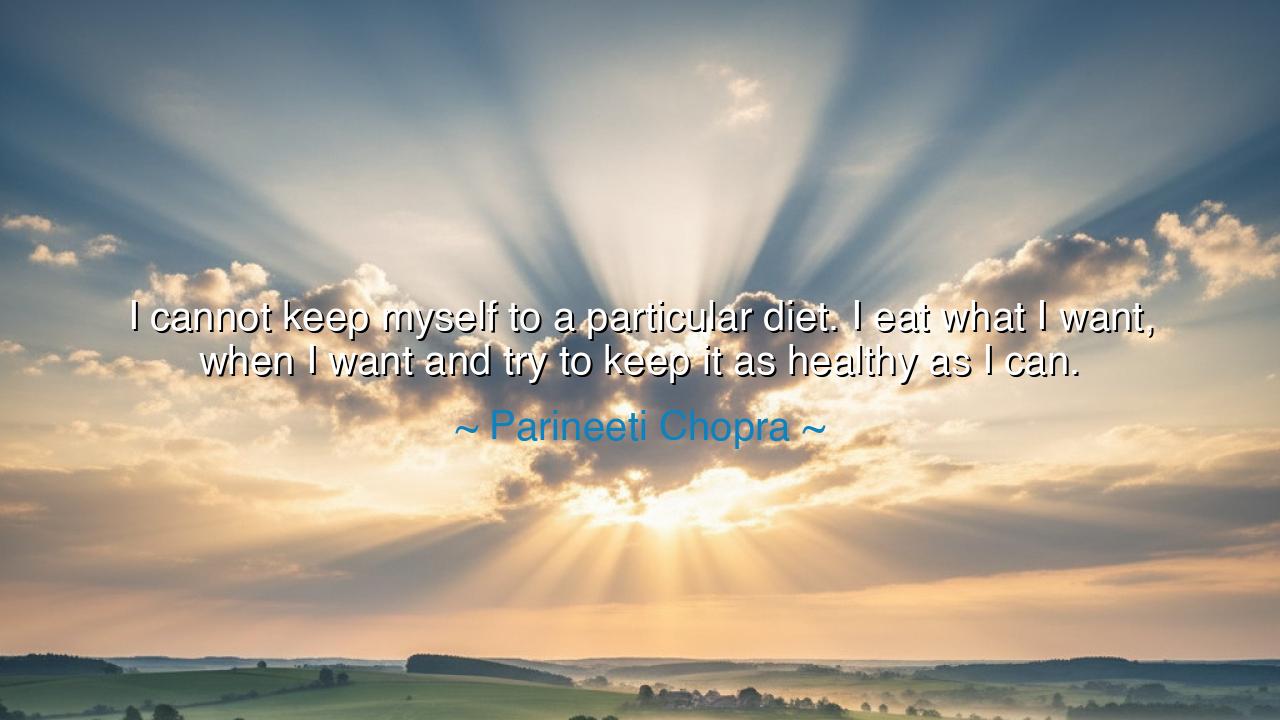
I cannot keep myself to a particular diet. I eat what I want
I cannot keep myself to a particular diet. I eat what I want, when I want and try to keep it as healthy as I can.






In the words of Parineeti Chopra, there breathes the spirit of balance and authenticity: “I cannot keep myself to a particular diet. I eat what I want, when I want, and try to keep it as healthy as I can.” At first glance, these words seem light, almost casual — but beneath them lies a wisdom ancient as the mountains, a lesson about freedom, discipline, and self-knowledge. For what she speaks of is not indulgence, but understanding; not rebellion, but harmony — the harmony between desire and reason, pleasure and restraint, the body and the mind.
From the earliest times, humankind has wrestled with this question: how does one live well? The Greeks called it sophrosyne — the art of moderation, the balance of the appetites. To eat, to drink, to rejoice are not sins, but when these acts are done without mindfulness, they become chains rather than joys. Parineeti’s words remind us that life, like the body, must be lived in rhythm — that a meal eaten with gratitude and awareness is worth more than a thousand rules followed with resentment. She rejects the tyranny of the strict diet, not to chase indulgence, but to honor intuition — the inner wisdom that knows what the body needs when the mind listens.
Consider the story of Epicurus, the philosopher so often misunderstood. He taught not the worship of pleasure, as some claimed, but the art of simple joy — to eat bread with contentment, to drink water with gratitude, to find peace not in abundance but in understanding what is enough. He once said, “Do not spoil what you have by desiring what you have not.” This same truth flows through Parineeti’s words. To “eat what I want, when I want” does not mean recklessness; it means to live with presence, to savor life without guilt, to choose not excess but awareness.
In a world that glorifies extremes — endless diets, impossible beauty, constant denial — her words are a breath of liberation. They are the song of one who has discovered that health is not punishment, but partnership. She understands that the body is not an enemy to be conquered, but a friend to be cared for. To “keep it as healthy as I can” is an act of humility — a recognition that perfection is neither possible nor necessary. The goal is not to fit into a mold, but to live in peace within one’s own skin. Such wisdom, though wrapped in simplicity, is the very heart of the ancient way.
The Stoics of old would nod in agreement. They taught that virtue lies not in denying the world, but in ruling the self. Parineeti’s approach mirrors this philosophy — to choose freely, yet with care; to enjoy, yet with consciousness. True discipline is not found in rigid control, but in the strength to choose well when choice is free. She has learned that balance is the mightiest of virtues, for from it flow all others: patience, gratitude, and peace. Those who starve the body in pursuit of perfection often starve the spirit as well; but those who listen, who nourish both body and soul, find wholeness.
Think, too, of the Buddha, who once practiced harsh fasting in his search for enlightenment. His body grew weak, his mind clouded, and his spirit heavy. One day, realizing his error, he took food offered by a kind woman and regained his strength. From that moment, he walked the Middle Path — the path between indulgence and deprivation. His wisdom echoes now through Parineeti’s simple confession: to eat without guilt, to care without obsession, to live without extremes. She, like him, reminds us that freedom and wisdom are born not in denial, but in moderation.
So let this be the lesson: in all things — whether food, work, or love — seek balance, not bondage. Eat what your body asks for, but listen when it whispers, not when it screams. Be mindful of your hunger, and grateful for your meal. Let health be not a burden but a blessing, not a battle but a rhythm. The body will serve you well if you treat it with kindness, and life will unfold gently if you walk it with awareness.
In the end, Parineeti Chopra’s words are not about diet at all — they are about living. To eat with joy, to move with freedom, to honor both craving and control — this is the ancient way of balance, the art of living wisely. So, dear listener, do not imprison yourself in the name of perfection. Instead, practice the quiet discipline of awareness. Feed the body with nourishment, the mind with gratitude, and the soul with joy — and you shall know what it means to live well, not by rules, but by harmony.






AAdministratorAdministrator
Welcome, honored guests. Please leave a comment, we will respond soon